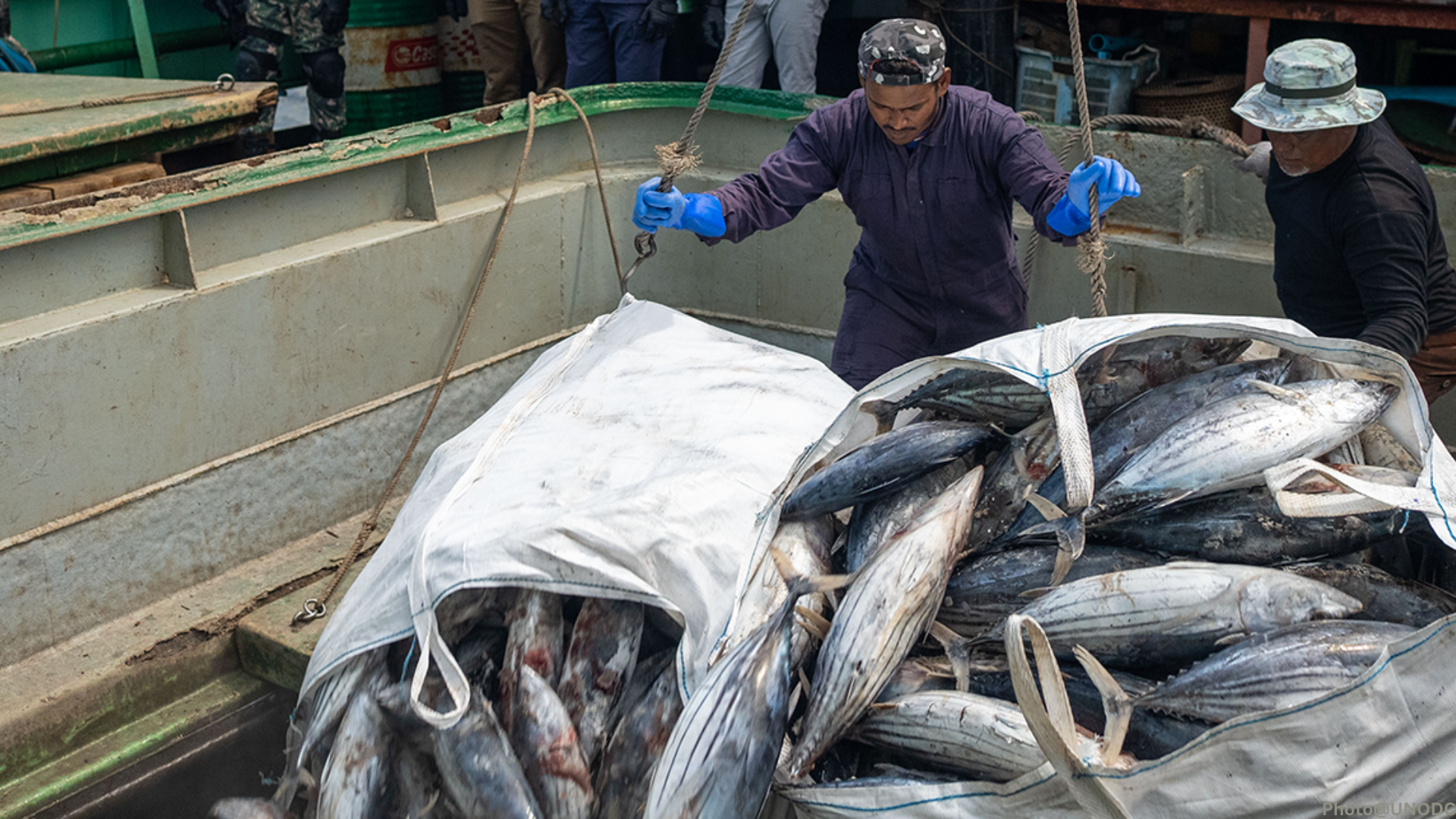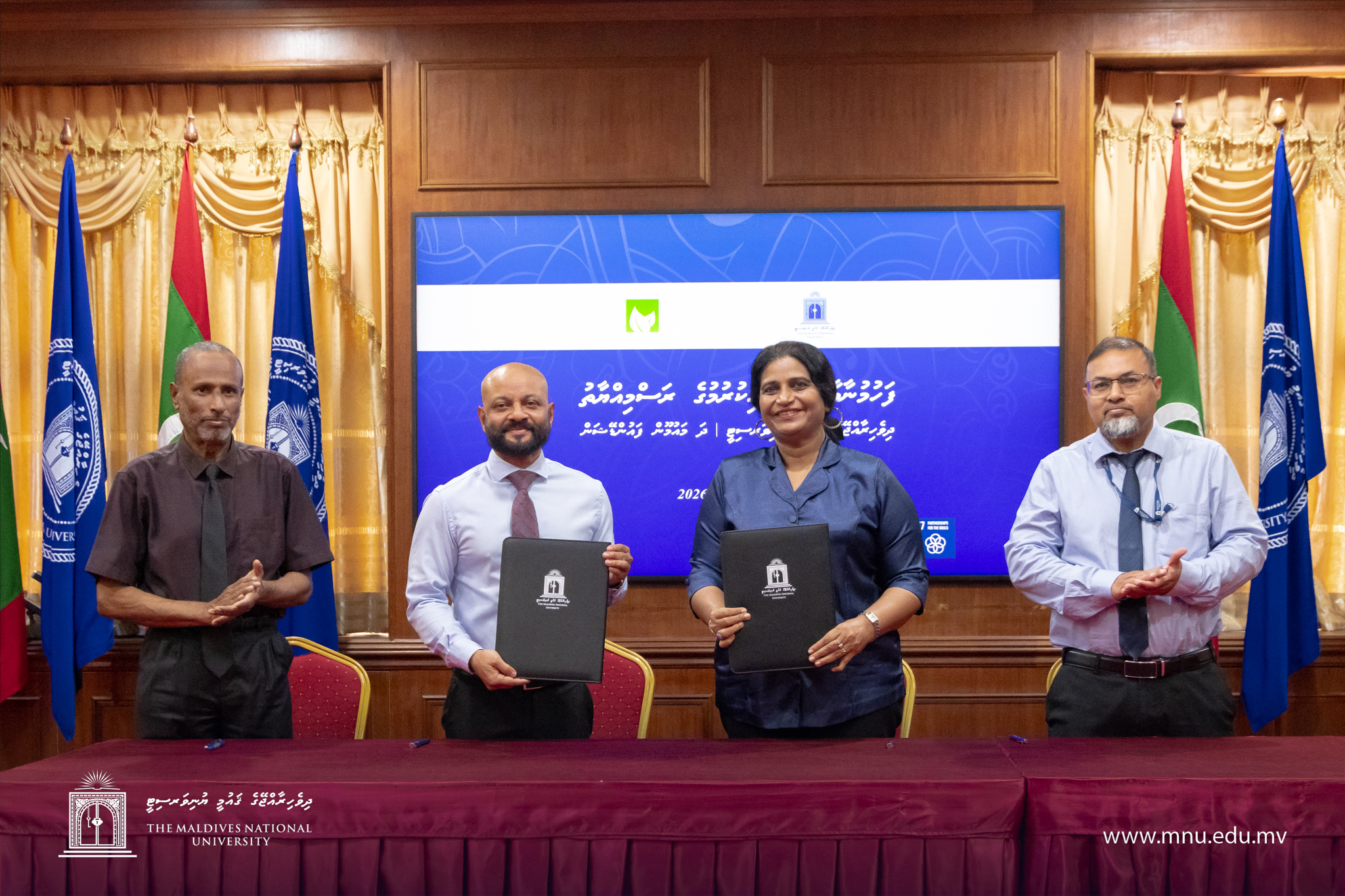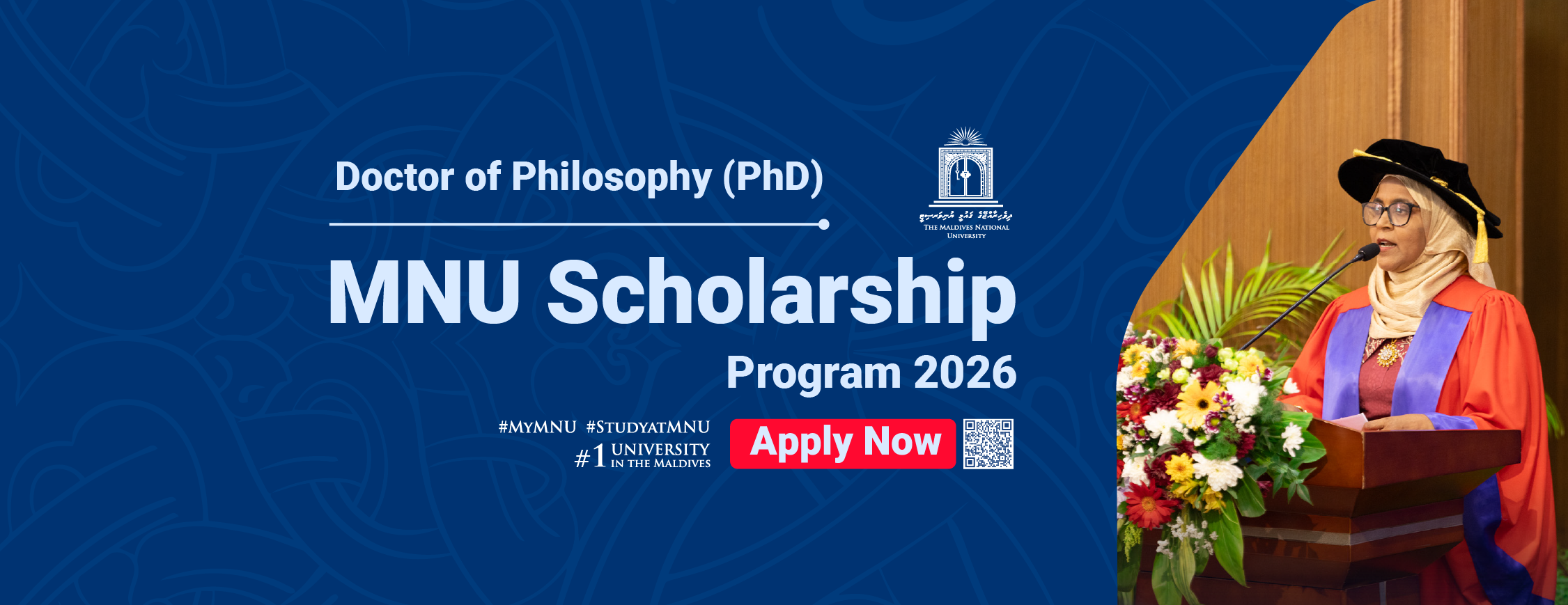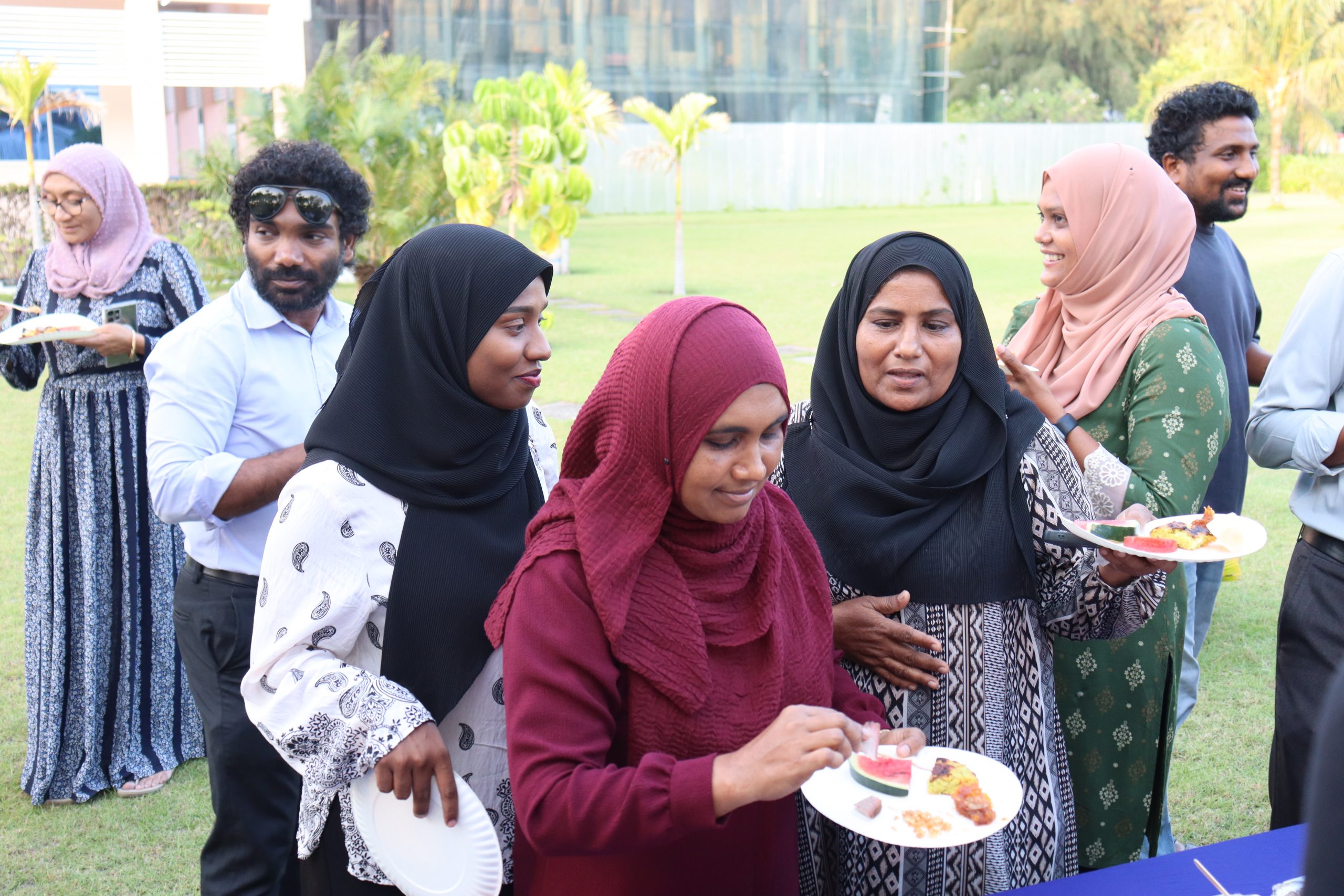Introduction
Food security remains underrepresented in national security discourse in Maldives. Despite increasing scholarly and development studies, small states often lack the policy capacity to integrate food insecurity into strategic planning, weakening disaster preparedness and resilience efforts.
Recognising the profound implications of food insecurity is crucial for small states facing acute climate threats. As rising seas and shifting ecosystems imperil both land and marine resources, a nuanced understanding that enables targeted, resilient policies that address vulnerability, safeguard livelihoods, and foster adaptive capacity amid escalating environmental and economic uncertainties is needed.
As a maritime state composed of 1,200 islands and 21 atolls, Maldives relies heavily on the ocean for its food systems and economic stability. According to FAO’s four-pillar framework, availability, access, utilisation, and stability Maldives faces acute vulnerabilities in availability and stability given that over 90 per cent of staple foods (rice, flour, and sugar) are imported, and local protein sources are almost entirely marine based making the country highly vulnerable to external shocks and disruptions in the supply chain. While tourism dominates the economy, fisheries remain vital for rural livelihoods and national food security, especially outside Malé. The National Fisheries and Agricultural Policy (2019–2029) emphasises the need to reduce dependency on imports by enhancing local fish availability and post-harvest infrastructure.
Regional cooperation is essential to this effort, enabling shared surveillance, trade resilience, and climate adaptation. For Maldives, securing local marine resources is not only a matter of economic diversification but a cornerstone of national resilience in the face of climate change and geopolitical uncertainty.
Framing Small States via Climate-Induced Food Insecurity
In Tuvalu, projections show a 23.4 per cent reduction in purse-seine catch under high emissions scenarios, risking a 12.6 per cent drop in government revenue. Similarly, Tropical Cyclone Pam in 2015 destroyed 60 per cent of pulaka pits, disrupting traditional food systems and exacerbating displacement and land competition.
Displacement in Tuvalu – driven by sea-level rise, coastal erosion, and frequent flooding – has profound implications for food security and regional stability. For example, the abandonment of pulaka pits and the transformation of land use in Funafuti reflect a breakdown in traditional agricultural practices and ecological knowledge, forcing communities to relocate inland or migrate inter-island and disrupting subsistence farming and livestock activities, which are already constrained by poor soil fertility and saltwater intrusion. Therefore, prioritising climate-resilient agriculture, reviving traditional food-acquiring skills, and securing climate finance for adaptive infrastructure are essential to stabilising communities and preventing cascading risks across the region.
Conflict-food security nexus suggests that resource scarcity, institutional fragility, and displacement are precursors to unrest. In small states, rising sea levels, coral bleaching, and declining fish stocks threaten coastal livelihoods and food access. While dependence on imports increases the risks of insecurity, internal food systems – i.e., for Maldives, fish account for a significant percentage of community nutrition – have been constantly threatened by human-induced activities, including Illegal, unreported, and unregulated (IUU) fishing by foreign vessels. During 2016-2017, over 400 vessels were caught in Maldives’ waters fishing illegally.
These challenges demand considering a broader aspect of security – one that includes ecological, human, and food system dimensions – and must include a regional approach to address capacity issues in small states. Dependence on regional cooperation must consider frameworks, like the Pacific Islands’ 2018 Boe Declaration on Regional Security, to strategically navigate small states’ interests, especially the climate-based security narrative, supporting data sharing for regional efforts.
Securing Food Insecurity in Maldives – a Regional Strategy
Locally, Maldives’ food insecurity is marine-based. According to Nadhiya Abdulla, Natalia Vasylieva, and Iryna Volovyk, during 2020-2024, over 98 per cent of the national fish catch comprises skipjack and yellowfin tuna – species vulnerable to warming seas and seasonal migration. While export volumes rise, domestic fish consumption is declining by 3.03 thousand tons annually, reducing protein intake by 3.3 grams per capita per day. Poorer atolls such as Haa Dhaalu, Alif Alif, and Vaavu face unstable catches and lack post-harvest infrastructure, deepening nutritional gaps. Maldives risks losing foreign exchange if tuna migrate eastward under climate stress along with nutritional deficits in rural islands such as Haa Dhaalu, Alif Alif, and Vaavu, posing a dual vulnerability in terms of security.
Securing maritime resources requires a two-pronged strategy. First, environmental conservation: For example, protecting the coral reefs, which span 4,500 km² and host over 1,100 fish species, protects against coastal hazards and underpins fisheries and tourism, contributing nearly 50 per cent of Gross Domestic Product (GDP) is vital. Second, security operations: the Maldives National Defence Force (MNDF) Coast Guard plays a critical role in deterring illegal, unreported, and unregulated (IUU) fishing, which undermines national sovereignty, threatens local fishers and depletes fish stocks.
Both elements of this strategy hinge on robust regional cooperation. While reliance on food imports is part of a broader regional approach – exemplified by Maldives’ longstanding trade of food-importing ties with India – true resilience can only be built by strengthening local capacities. For example, development aid has significantly supported marine conservation initiatives, while defence collaborations with India and Sri Lanka, enhancing surveillance and response to IUU fishing, may not complete data collaboration efforts.
Regional Mechanisms and Collective Security
Indian Ocean Rim Association (IORA) and the Southwest Indian Ocean Fisheries Commission (SWIOFC) can bolster Maldives’ marine conservation by promoting coordinated governance, technical assistance, and shared surveillance systems. IORA and SWIOFC often rely on member state contributions and external research partnerships to fill these data gaps.
IORA and SWIOFC significantly enhance Indo-Pacific maritime security by promoting legal harmonisation, regional dialogue, and coordinated surveillance. IORA’s Working Group on Maritime Safety and Security (WGMSS) facilitates practical cooperation among member states – including Maldives – through shared frameworks and capacity-building initiatives aimed at addressing transboundary maritime threats such as IUU fishing, piracy, and trafficking. SWIOFC supports sustainable fisheries governance and evidence-based management across its member states, including Maldives, through regional coordination and data-driven policy advice.
Surveillance and monitoring of IUU fishing are strengthened through real-time data sharing. For example, Trygg Mat Tracking (TMT) collaborates with IORA and other regional bodies to analyse AIS and satellite data, identifying suspicious vessel patterns and ownership structures. TMT’s tools—such as the Combined IUU Vessel List and Vessel Viewer—enable enforcement agencies to track vessel movements and assess risk profiles. Australia’s Australian Fisheries Management Authority (AFMA) uses this intelligence to guide regional patrols and targeted enforcement actions, working closely with Maritime Border Command (MBC), a multi-agency taskforce that coordinates aerial and surface surveillance across Australia’s maritime domain.
Meanwhile, the U.S. Coast Guard’s Illegal, Unreported, and Unregulated Fishing Center of Expertise (USCG-IUUF COE), based in Hawaii, serves as the international engagement arm for counter-IUU efforts in the Indo-Pacific. It provides partner nations with access to global databases, incident reports, and best practices, supporting bilateral law enforcement agreements and capacity-building initiatives.
Collectively, Maldives can enhance its maritime domain awareness, strengthen food security by deterring IUU fishing through legal harmonisation, surveillance coordination, and data sharing. As summarised in Table 1, various regional and international mechanisms provide technical, operational, and diplomatic support that directly bolster Maldives’ capacity to combat IUU fishing.
Table 1: Various Regional and International Mechanisms
|
Organisations / Mechanisms
|
Support Activities for IUU Monitoring
|
Maldives’ Gains
|
|
Indian Ocean Rim Association (IORA)
|
Facilitates regional dialogue and legal harmonisation.
Promotes data sharing and maritime cooperation.
|
Strengthened diplomatic leverage in regional forums.
Improved legal frameworks.
|
|
SW Indian Ocean Fisheries Commission (SWIOFC)
|
Supports fisheries governance and MCS training.
Coordinates regional fisheries data and assessments.
|
Enhanced technical capacity in fisheries management.
Access to regional data.
|
|
Trygg Mat Tracking (TMT)
|
Provides AIS-based vessel tracking and risk analysis.
Detects suspicious patterns and IUU hotspots.
|
Real-time surveillance capabilities.
Early warning for illegal vessel activity.
|
|
Australian Fisheries Management Authority (AFMA)
|
Offers technical assistance and patrol coordination.
Mentors Coast Guard personnel in MCS operations.
|
Operational upskilling of the Coast Guard.
Strengthened bilateral security ties.
|
|
U.S. Coast Guard IUU Fishing Center of Expertise
|
Enhances Indo-Pacific maritime coordination.
Supplies operational tools and strategic frameworks.
|
Integration into Indo-Pacific security architecture.
Access to strategic tools.
|
Conclusion
Maldives’ path to food security and national resilience lies not in isolation, but in strategic integration of local marine resource management, regional partnerships, and adaptive governance. As a small maritime state, its resilience depends on the health of its ocean and the strength of its cooperation to support the capacity to secure food systems. High dependency on imports and climate-sensitive fisheries exposes Maldives to external shocks and nutritional gaps, which is not alone an economic concern but also a national security priority. Integrating food security into a broader security framework will enable Maldives to safeguard the livelihoods and attain stability and adaptability in the escalating environmental and geopolitical uncertainties.
Authors
Dr Athaulla A Rasheed is the Head of Centre at the Centre for Security and Strategic Studies at The Maldives National University. A former foreign service officer and diplomat at the Ministry of Foreign Affairs, Maldives, Athaulla also holds two PhDs in international and strategic studies, and political science from ANU and the University of Queensland, Australia.
Dr Nadhiya Abdulla is a Senior Research Fellow and Head of the Research Development Department at The Maldives National University. A former educator and curriculum developer, she holds a PhD in Management from Dnipro State Agrarian and Economic University, Ukraine, with a research focus on sustainable farming systems in the Maldives. Her work spans agriculture, food security, and development policy.





